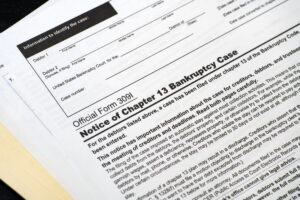Every once in a while I get a call from someone who has filed their own bankruptcy case. I hate to say it, but inevitably they’re calling because somewhere along the line they made a mistake. Now they’re calling to get advice on how they can untangle the problem. While my policy is generally not to get involved in a case that’s already been filed (who knows what other landmines are there), I’ll always take the time to listen and provide any insight I can.
I got a call like that yesterday and it had to have been one of the most unfortunate cases I have heard. The caller was an older woman. She had filed a Chapter 7 bankruptcy petition on her own and had already been to the meeting of creditors. Apparently the trustee started asking questions about her retirement fund and wanted more information. The caller wanted to know what she could do to get her bankruptcy dismissed.
First, it is very difficult to get a Chapter 7 bankruptcy voluntarily dismissed. I told her she would have to ask the court to dismiss the case.
Then we moved onto the issue of her retirement fund. She was retired and had put her money (about $50,000) into a “profit-sharing” plan. I’ll be honest, I had no idea what that is. But I asked her more about it and she told me that she was the trustee of this profit sharing plan. That sounded like a trust to me. In Colorado, trusts are generally non-exempt (unprotected) property when you file bankruptcy, unless there’s a “spendthrift” clause in it. Which means that the trustee is going to do everything she can to get the money in the profit sharing plan.
It sounded to me as if the caller had heard somewhere along the line that retirement funds are protected in bankruptcy. The problem is that you can’t just call something a retirement fund and expect it to be protected. While bankruptcy can protect your retirement fund, the retirement fund must fall within a certain legal definition.
The bottom line is that the caller is probably going to lose her nest egg. If she had called me before she filed her petition that would have been avoided. There are all sorts of sources online encouraging people to file their own bankruptcy. And people file bankruptcy on their own all the time without a problem. But if you’re going to file on your own, do your homework. Make sure that your property is protected under the exemption rules. That can take a lot of work. Or you can hire someone who can tell you as soon as you sit down for a consultation whether or not your property is protected.
If you’re thinking about bankruptcy and are wondering if your retirement fund is protected, please come in for a free, no-obligation consultation with an experienced bankruptcy attorney. You can use our online scheduling system to make an appointment or call 303.331.3403 to set a time that’s convenient for you.


